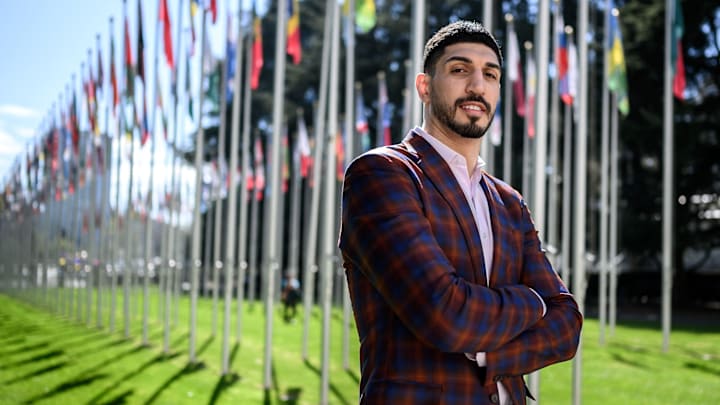The big man who never played at Rupp
Enes Kanter was supposed to be the next Kentucky star. In 2010, he arrived in Lexington with towering expectations. Some recruiting services ranked him as the best player in the nation, and John Calipari envisioned him as the centerpiece of a title-contending roster.
But Kanter never played a second of college basketball.

The NCAA ruled him permanently ineligible after Fenerbahçe, his former Turkish professional team, handed over documents showing he received more than $100,000 in cash and benefits. Kentucky argued the payments were akin to prep school scholarships, but the NCAA didn't buy it. The Wildcats appealed the decision, hoping to unleash Kanter midway through the season. That appeal was denied in January.
Just like that, the dream of Kanter running out of the tunnel and on to the floor at Rupp Arena was dead.
But the story didn’t end there. In fact, it was only just beginning.
A consistent NBA career
While the NCAA closed a door, the NBA opened one. Kanter was drafted No. 3 overall in the 2011 NBA Draft by the Utah Jazz. He went on to play for six different franchises, including memorable stints in Oklahoma City, New York, Portland, and Boston.

He became known as one of the league’s most reliable rebounders and low-post scorers, finishing his career with averages of 11.2 points and 7.8 rebounds per game across 748 games. At his peak in OKC and New York, he averaged double-doubles with regularity and shot near 60% from the field. Offensively, he was a force. Defensively—well, the memes told the story—but he carved out over a decade in the world’s toughest basketball league.
Enes ‘Freedom’ Kanter legendary career
— CELTICS ☘️ BANNER 19 (@BiggLynch) August 19, 2023
& His lockdown DEFENSE 🔒🔥🔥🔥 pic.twitter.com/swMgug8Mo1
Still, basketball was only half of what made Enes Kanter’s story remarkable.
Persona non grata
Born in Switzerland and raised in Turkey, Kanter’s journey took a political turn most NBA players would never dare take. His target? Turkish President Recep Tayyip Erdoğan.
Erdoğan, who tightened his grip on power following a failed coup attempt in 2016, accused Kanter’s spiritual mentor, Fethullah Gülen, of orchestrating the coup. Gülen, a U.S.-based Islamic cleric, denied any involvement—but Turkey issued an arrest warrant. Kanter stood by Gülen, which made him a political enemy in his homeland.
The consequences were immediate and devastating.
In 2017, Turkey revoked Kanter’s passport. He was labeled a terrorist by the Turkish government. His family publicly disowned him. His father, Mehmet Kanter, wrote in a letter, “With a feeling of shame I apologize to our president and the Turkish people for having such a son.”

Kanter responded on Twitter: “Today I lost those who for 24 years I called … my family.”
Since then, he has not returned to Turkey. His NBA games were censored on Turkish television. He skipped international team trips for fear of arrest. His free basketball camps in the U.S. even drew harassment from Turkish consulates.
Yet Kanter kept speaking out.
Enes Kanter Freedom
After years of activism, Kanter took a symbolic step—he legally changed his name to Enes Kanter Freedom in 2021 upon becoming a U.S. citizen. The name wasn’t a brand move—it was a statement.
He began to shine a global spotlight not just on Turkey, but on China as well.
At a basketball camp in New York, a parent confronted him about his silence on China’s treatment of Uyghur Muslims. That moment was a turning point.
“I remember taking a picture with this kid,” Freedom told a Congressional committee. “And his parents called me out in front of everybody.”
The challenge struck deep. Freedom, a practicing Muslim himself, began publicly condemning China’s treatment of Uyghurs and Tibetans. He wore sneakers painted with slogans like Free Tibet. He was outspoken against Nike’s alleged use of forced labor, even calling out LeBron James and other NBA stars for their silence.
The NBA didn’t punish him—but his career quietly faded. “After the third game, one of my teammates walked up to me and said, “Enes, you know this is your last year in the NBA right, if you ever criticize China, NIKE then you never gonna be able to play basketball in this league. So have fun, smile and I hope we win a championship this year because this is your last year, and your basketball career is going to end.”
“And that’s pretty much what happened,” he told the congressional panel.
Bigger than the game
There’s no Hollywood ending here. Kanter never got to play for Kentucky. His NBA career didn’t finish with a ring or a farewell tour. And his activism cost him relationships, career opportunities, and a sense of home.
But for Enes Kanter Freedom, the cause was bigger than any court.
From a young man denied a chance to play at Rupp Arena to a global voice for justice, Kanter turned personal loss into public purpose. And while he may never hoist a championship trophy or have his jersey retired, he’s worn something more powerful—conviction.

In a world where athletes are often told to “stick to sports,” Enes Kanter Freedom never listened.
And in doing so, he became unforgettable.
portions of this article were sourced from Vox and VOA
